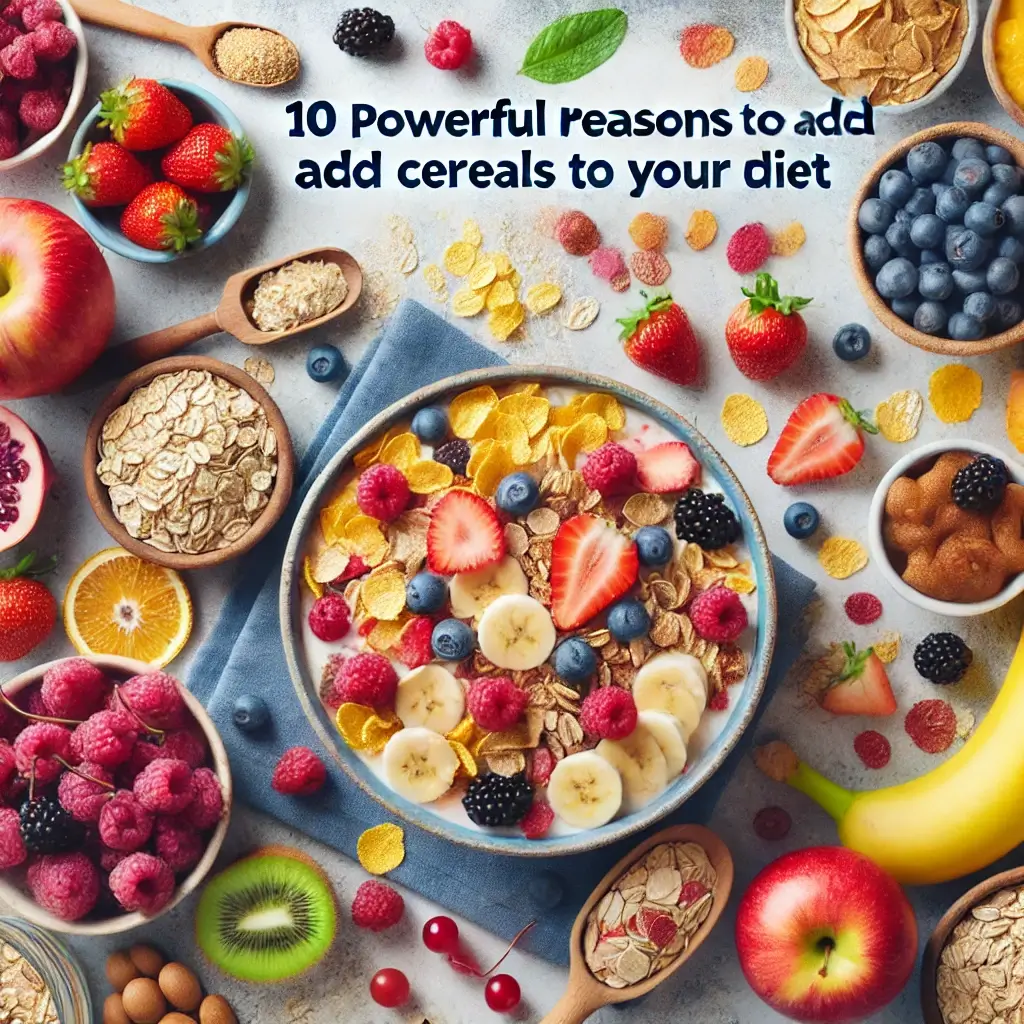Introduction
Cereals, derived from grains like wheat, oats, rice, and corn, are essential staples in human nutrition. They provide vital nutrients, including fiber, vitamins, and minerals, supporting overall health. As a primary source of carbohydrates, cereals deliver sustained energy throughout the day, making them a key part of balanced diets worldwide.
High-fiber cereals aid digestion, regulate blood sugar, and promote heart health by lowering cholesterol. Many cereals are also fortified with essential nutrients like iron, calcium, and folic acid, helping prevent deficiencies. Their versatility allows them to be easily incorporated into meals, from breakfast bowls to baked goods and smoothies.
Whether enjoyed with milk, mixed into yogurt, or used in cooking, cereals offer a convenient and nutritious option for busy lifestyles. This article explores the benefits of cereals, their role in health, and how to incorporate them into a well-balanced diet.
Nutritional Value of Cereales
Cereales are packed with a variety of essential nutrients that support overall health. They are typically rich in carbohydrates, which provide a steady source of energy throughout the day. Cereales are also a great source of fiber, which is vital for digestive health. Additionally, many cereals are fortified with vitamins and minerals, such as iron, zinc, and folic acid, which play crucial roles in maintaining healthy bodily functions.
The nutrient profile of cereales varies depending on the type. For example, oats are rich in beta-glucan, a type of soluble fiber known to help reduce cholesterol levels. Whole-grain cereales provide more fiber and nutrients than refined grains. Furthermore, cereals such as wheat, corn, and rice offer essential minerals like magnesium, phosphorus, and potassium, contributing to muscle function and bone health. Including cereales in your diet ensures a steady supply of important nutrients that can help prevent nutrient deficiencies.
Health Benefits of Cereales
Cereales offer a wide array of health benefits, making them an essential part of a balanced diet. One of the main advantages of cereales is their ability to support digestive health. The fiber in cereals helps maintain regular bowel movements, preventing constipation and promoting a healthy gut microbiome. Additionally, the fiber content aids in regulating blood sugar levels, making cereales a good choice for those managing diabetes.
Another key benefit of cereales is their contribution to heart health. Whole-grain cereals have been shown to lower cholesterol levels, reducing the risk of heart disease. The antioxidants found in certain cereals, such as oats and barley, help protect against oxidative stress and inflammation, further supporting cardiovascular health. Incorporating cereales into your daily diet can also improve blood pressure levels, making them a heart-healthy option for individuals of all ages.
How to Include Cereales in Your Diet
Including cereales in your diet is easy and can be done in a variety of ways. For a quick and nutritious breakfast, you can enjoy cereales with milk, yogurt, or fruit. Choose whole-grain varieties to ensure maximum nutritional benefits. You can also add nuts, seeds, or berries for an extra boost of vitamins, minerals, and healthy fats.
Another great way to incorporate cereales is by adding them to smoothies. Blend oats or wheat germ into your smoothie for added fiber and energy. For lunch or dinner, you can use cereales in salads, soups, or casseroles. Whole grains like quinoa, barley, and brown rice serve as excellent base ingredients for hearty, satisfying meals. By experimenting with different types of cereales, you can enjoy their health benefits while keeping your meals interesting and flavorful.
Common Types of Cereales
There are several types of cereales to choose from, each with its own unique nutritional profile. Some of the most common types of cereales include:
- Oats: Rich in fiber and antioxidants, oats are a popular breakfast choice. They are known to lower cholesterol levels and improve heart health.
- Wheat: A widely consumed cereal, wheat is available in various forms, such as whole wheat, wheat bran, and bulgur. It provides essential nutrients, including B vitamins, iron, and magnesium.
- Rice: Rice, particularly brown rice, is a good source of fiber and contains important minerals like manganese and selenium.
- Corn: Corn-based cereales, such as cornflakes, provide a quick energy source and contain essential vitamins, including vitamin C and thiamine.
What Are Cereales?
Cereales refer to grains that are cultivated for human consumption. They include a wide range of foods, such as oats, wheat, rice, corn, and barley, which are processed into various cereal products. Cereales are rich in essential nutrients, including carbohydrates, proteins, and fiber, making them an important dietary staple.
Rich in Fiber
One of the most notable benefits of cereales is their fiber content. Fiber is crucial for maintaining digestive health, regulating blood sugar, and lowering cholesterol levels. Whole-grain cereales are particularly high in fiber, which helps promote satiety, control appetite, and support long-term weight management. Fiber also contributes to a healthy gut microbiome by encouraging the growth of beneficial bacteria. Therefore, including fiber-rich cereales in your diet can significantly improve your overall health and wellness.
Packed with Essential Nutrients
Cereales are an excellent source of essential nutrients necessary for maintaining a healthy body. These include vital vitamins, minerals, and antioxidants that support bodily functions. For instance, cereales like oats and wheat are rich in B vitamins, which help energy production and support brain function. Many cereales are also fortified with key nutrients like iron, calcium, and folic acid, preventing nutritional deficiencies.
By incorporating cereales into your daily meals, you ensure a steady supply of important nutrients. The combination of carbohydrates, proteins, and healthy fats in cereales contributes to immune system support, healthy skin, and overall wellness. Eating a variety of cereales, such as whole wheat, oats, or brown rice, ensures you receive a broad range of nutrients. This makes them a vital part of a balanced and healthy diet.
Boosting Energy LevelCereales are an excellent source of long-lasting energy. The complex carbohydrates in cereales are digested slowly, providing a steady release of energy. Unlike simple sugars, which cause rapid spikes and crashes in blood sugar levels, the carbohydrates in cereales ensure gradual energy release over time.
Including cereales like oats or quinoa can help prevent fatigue and keep you energized. These cereales contain natural sugars and starches that are absorbed slowly, offering sustained energy. This makes them perfect for athletes or individuals who need energy to perform physical or mental tasks. Regularly consuming cereales promotes higher energy levels and supports overall performance throughout the day.
Supporting Heart Health
Cereales play a key role in supporting heart health. Whole-grain cereales like oats and barley are rich in soluble fiber, which helps lower cholesterol levels. Reducing cholesterol prevents plaque buildup in arteries, decreasing the risk of heart disease and stroke. The antioxidants in cereales also help reduce inflammation and protect the heart from oxidative stress.
Additionally, the fiber content in cereales helps manage blood pressure. By regularly consuming heart-healthy cereales like oats or wheat, you can support a healthy heart and reduce the risk of chronic cardiovascular issues.
Enhancing Digestion
Cereales are excellent for improving digestive health. The fiber in cereales helps regulate bowel movements, preventing constipation, and promoting a healthy gut. Fiber also supports the growth of beneficial gut bacteria, which plays a crucial role in digestion.
Furthermore, many cereales contain prebiotics that nourish good bacteria in the digestive system. This promotes a healthy gut microbiome, improving nutrient absorption and digestion. Regular consumption of fiber-rich cereales can prevent digestive issues, such as bloating and indigestion, while improving nutrient absorption.
Best Time to Eat Cereales
The best time to eat cereales depends on your lifestyle and dietary needs. Many people enjoy cereales in the morning, as they provide a nutritious and energizing start to the day. When consumed as part of breakfast, cereales can help stabilize blood sugar levels and keep you full throughout the morning. Whole-grain cereales are especially beneficial, offering sustained energy.
However, cereales can also be enjoyed as a snack or incorporated into other meals throughout the day. Add oats or quinoa to smoothies, salads, or soups for added nutrients and fiber. Ultimately, cereales can be consumed whenever you need an energy boost, whether in the morning or throughout the day.
Recipes with Cereales
Incorporating cereales into your meals is simple and enjoyable. Here are a few recipes featuring cereales as a main ingredient:
- Oatmeal with Fresh Fruit and Nuts: Start your day with a hearty bowl of oats. Top with fresh berries, nuts, and a drizzle of honey for a nutritious breakfast.
- Quinoa Salad: Toss cooked quinoa with vegetables, olive oil, lemon juice, and herbs for a light, protein-packed meal.
- Whole-Wheat Pancakes: Use whole wheat flour for fluffy pancakes. Top with fresh fruit and yogurt for a filling breakfast.
- Cornflakes Snack Bars: Combine cornflakes, honey, peanut butter, and dried fruits for a quick, crunchy snack.
FAQs:
Is cereal a soup?
No, cereal is not a soup. Both cereal and soup can be served in a bowl with liquid, but they have significant differences. Cereal typically consists of grains like oats, wheat, or corn and is often paired with milk or yogurt. Soup, however, usually starts with a liquid base such as broth or water, and it may contain vegetables, meat, and various seasonings. Cereal is generally sweet and served as a breakfast dish, whereas soup is often savory and served as a starter or main course.
10 Cereals Name
Here are 10 popular cereals:
- Cornflakes
- Oats (Instant Oats, Rolled Oats, Steel-Cut Oats)
- Rice Krispies
- Wheat Chex
- Bran Flakes
- Shredded Wheat
- Cheerios
- Frosted Flakes
- Special K
- Cinnamon Toast Crunch
These cereals vary in texture, flavor, and nutritional content, offering different benefits depending on the type of grain used.
Cereal Brands
Some well-known cereal brands include:
- Kellogg’s
- General Mills
- Post Consumer Brands
- Quaker Oats
- Nature Valley
- Bob’s Red Mill
- Barbara’s Bakery
- Bear Naked
- Erewhon
- Kashi
Breakfast Cereal
Breakfast cereals are a quick and convenient food option typically made from grains such as wheat, oats, corn, or rice. They are often served with milk or yogurt and can be topped with fruits, nuts, or seeds. Breakfast cereals come in various forms, including flakes, puffs, and granola. Some breakfast cereals are sweetened, while others are unsweetened or flavored with fruits and spices.
They provide a good source of carbohydrates, vitamins, and minerals, making them a popular choice for a fast and nutritious start to the day. Whole-grain cereals are especially beneficial as they offer added fiber, which aids in digestion and helps maintain stable blood sugar levels.
Conclusion
In conclusion, cereals offer more than just a quick and convenient meal option. Packed with essential nutrients, they provide numerous health benefits. Whole grain cereals boost energy levels and support heart health by reducing cholesterol and improving circulation. Their high fiber content aids digestion, promotes regular bowel movements, and helps with weight management. Additionally, cereals are a great source of important vitamins and minerals like iron, calcium, and B vitamins, contributing to overall wellness. Including a variety of cereals in your daily diet enhances both health and meal versatility. Whether you prefer oats, wheat, or corn-based cereals, each type brings unique benefits. You can easily incorporate cereals into your breakfast, snacks, or even salads. The next time you need a nutritious food choice, consider adding cereals to your meal plan. They play an essential role in supporting a healthy, balanced lifestyle.

